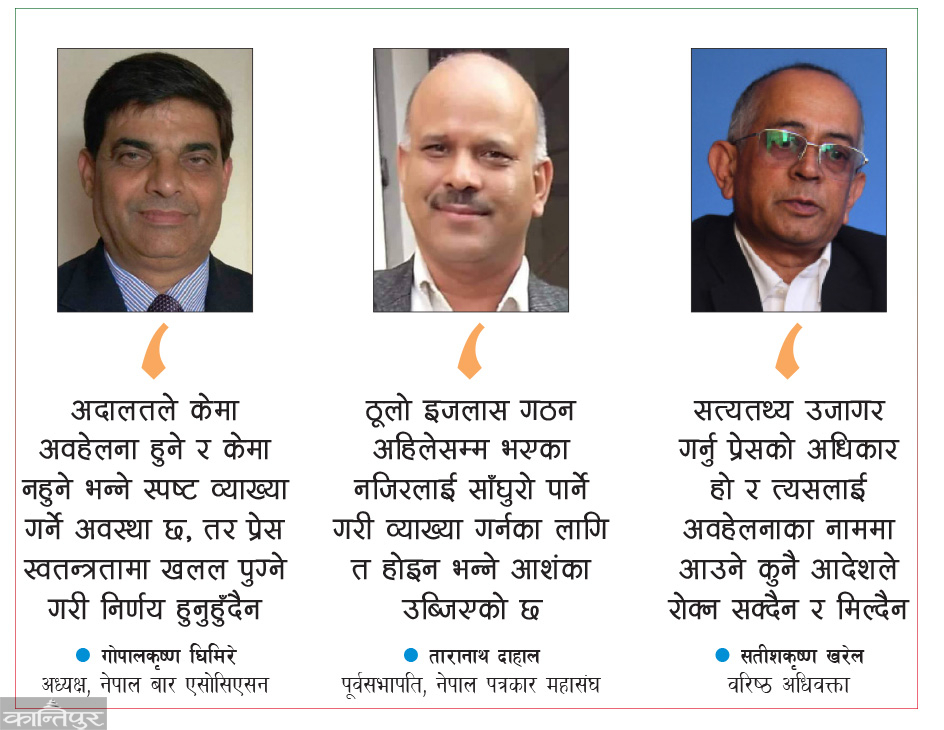Dark File: Full Bench Verdict Coming: Expert's Interest in Balancing Free Speech and Contempt of Court

We use Google Cloud Translation Services. Google requires we provide the following disclaimer relating to use of this service:
This service may contain translations powered by Google. Google disclaims all warranties related to the translations, expressed or implied, including any warranties of accuracy, reliability, and any implied warranties of merchantability, fitness for a particular purpose, and noninfringement.

Highlights
- Since a criminal case has been registered in Kathmandu district court against the producers and broadcasters of well-planned and broadcast audio, there is concern about the verdict on sensitive issues such as press, freedom of expression and defamation of the court.



After hearing the contempt case filed against the publisher, editor and video producer of 'Sidha Kura' online and YouTube channel, which broadcasts 'fake audio' prepared to assassinate the character of judges, lawyers and media industry, the 9-member bench of the Supreme Court is preparing for its verdict.

Since a criminal case has been registered in Kathmandu District Court against the producers and broadcasters of well-planned and broadcast audio, the interest of the stakeholders has increased on the decision on sensitive matters such as press, freedom of expression and defamation of the court.
The current bench is rarely constituted. Earlier Dr. The contempt case filed against Govind KC and Kantipur Publications was delivered on 23 Jan 2076 by a seven-judge full bench, which delivered a sweeping verdict on freedom of expression and press.
Due to the lockdown during the covid period, a full bench of all 19 members of the Supreme Court, including the then Chief Justice Cholendra Shamsher Rana, was formed to decide the extent of any case. The bench gave its judgment on 15th May 2077 and considered the closure as zero time and decided that no case would be statute-barred for 30 days after the court opened.
According to senior advocate Purnaman Shakya, an 11-member full bench was also formed to pronounce a decision on the issue of dissolution of parliament by the then Prime Minister Girija Prasad Koirala and Manmohan Adhikari. Otherwise, the cases will be heard by a three-member full bench, legal experts say.
'I am not aware that a 9-member full bench has been formed in recent times,' says former registrar Ramakrishna Timilsina. He says that there is a suspicion that it is not meant to narrow down the existing precedents. He says, 'Recently, the court has been lenient in the matter of contempt and has been the protector of the press and freedom of expression, which has finally made the court itself more respected, but now there is a common suspicion that it is not trying to restrict that liberality.' If the decision made by the established bench is sensitive, if it has to be rewritten, then a bigger and rarer bench should be formed. "Therefore, if such a large bench makes a narrow decision, there is no room to challenge and correct it," says senior advocate Balkrishna Neupane. In the case against Rajkumar Timilsna, who produced and broadcast the
, and Yuvraj Kandel, the executive editor of Siddha Kura Online, the bench of judges Kumar Chundal and Vinod Sharma ordered to send it to a full bench of 9 members. . Accordingly, the bench of Chief Justice Vishwambhar Prasad Shrestha, Justices Prakashman Singh Raut, Sapna Pradhan Malla, Prakash Kumar Dhungana, Hari Phuyal, Nahkul Subedi, Vinod Sharma, Mahesh Sharma Paudel and Balkrishna Dhakal has given the date of hearing on July 17 to pronounce the decision on August 6. After the technical test confirmed that the
audio is fake, a criminal case has been filed against all three of them in the Kathmandu District Court under the Electronic Transactions Act. Although the accused were active in the capital, Shyam Gyawali, who was made the CIB chief in the confidence of the then Home Minister Ravi Lamichhane, gave a report stating that they were 'absconding'.
 A criminal case has been registered in the district court on the issue of intentionally producing and broadcasting audio, and the concern has also increased because the Supreme Court is about to decide on defamation of the court from a rare bench.
A criminal case has been registered in the district court on the issue of intentionally producing and broadcasting audio, and the concern has also increased because the Supreme Court is about to decide on defamation of the court from a rare bench.
The earlier judgments of the courts on press freedom, contempt of court and criminal cases have also given clear guidelines. Criticizing the then Chief Justice Gopal Parajuli. The defamation suit filed against Kantipur for publishing the news on Govind KC and Parajuli's age dispute was viewed as integrated. Parajuli was automatically relieved of his post after it was proved that he had falsified his age. However, in contempt of court, a larger full bench comprising seven Supreme Court judges Deepak Kumar Karki, Meera Khadka, Harikrishna Karki, Vishwambhar Prasad Shrestha, Ishwar Prasad Khatiwada, Anandmohan Bhattarai and Prakashman Singh Raut gave a historically liberal and scholarly judgment.
Senior advocate Neupane suggests that the court should be lenient in taking further action as that will be the biggest lesson after going to criminal proceedings. "I went to the 9-member bench and requested the same thing," he said.
A precedent has been set in the judgment to maintain a proper balance and harmony between freedom of expression and the right to take action in contempt of court and to strengthen the principles of tolerant democracy. According to the Supreme Court, only the penal provisions in the Criminal and Civil Codes can be used as an alternative to the action that may be taken in contempt.
In the nature of the case where a criminal offense is determined, the court, based on the principle that the contempt of the court should not be prosecuted, gave the precedent that the court should protect itself as much as possible from using the weapon of contempt. Obstruction of the administration of justice is usually contempt. However, some of these things which are considered to be obstructions may be defined as offenses against public justice in the country's criminal law and even punished,' it is mentioned in the example, 'in such cases, the incident is addressed as a violation of the criminal law rather than the way of contempt.' break In the Criminal Code, 2074, acts of creating false evidence, harboring criminals, being absent against the conditions of bail, resisting arrest, escaping from arrest, etc. are considered to cause obstruction in the administration of justice and since it is already addressed by the criminal law, it is a criminal offense related to contempt. The court ruled that it is not necessary to call criminal contempt as it is appropriate to take action under the law.
The concept of freedom of thought and expression developed in recent times is relatively tolerant and the Supreme Court has ruled that it should be maintained. Citing the case of journalist Harihar Virhi, who was convicted for contempt of court for making a cartoon of the then Chief Justice Vishwanath Upadhyay, the judgment said, "If we review the old cases today from a tolerant and moderate point of view, in some cases, different results can be seen." Looking at the recent liberal view adopted by the court, it is possible that the opinion taken by this court in some cases can no longer be maintained. For example, contempt proceedings against an investigative article or a cartoon printed on a court matter are becoming irrelevant in the current situation. It is hardly thought that such matters can even be prosecuted.
It is also mentioned in the judgment that the latest concept developed in Nepal about the power to punish contempt is liberal, tolerant and moderate and is also informed by the concepts developed in human rights and comparative jurisprudence. is "Where there is an alternative, it seems that it is appropriate to adopt an alternative to contempt proceedings," the full text of the judgment says, "in some cases, the jurisdiction of contempt is a supplementary jurisdiction to remove obstruction of justice." The court that conducts open hearings should accept open communication,' the full bench said, 'justice itself should not be distorted by the arbitrary use of the weapon of contempt.' It is said that journalists should have the right to make news or comment or criticize publicly available facts related to the work of courts or judges, unless the law or the court expressly orders that certain things should be kept secret for some time or permanently, and the opening of such publicly available truths is not considered harmful. Rather, it is an important defense to a charge of contempt that the truth has been disclosed.' It is also the opinion of the Supreme Court. "Whether it's a case of defamation or contempt, the media sector has defended its actions by publishing clean, neutral news or comments or delivering matters of public interest to the people like the post office, and these things have been accepted even in the judicial process," the court clarified. "Fair hearing and free press are two competing values," the judgment said. Courts have recently accepted that there is a need for a proper balance between them.'' It is understood by legal experts that assessment can be done easily. "Freedom of press and expression is ensured by the constitution, but this does not mean that you can say whatever you want," says senior advocate Satishkrishna Kharel However, he argues that the decision of the Supreme Court cannot suppress the right to information provided by the constitution and the right to freedom of press and expression. "It is the right of the press to reveal the truth and no order that comes in the name of contempt can and cannot stop it," he says. It can't be done and it won't be done.''
Nepal Bar President Gopalkrishna Ghimire has analyzed the formation of a 9-member bench to issue a directive interpretation of the Supreme Court. "The formation of the largest bench in the contempt case so far means that the court is very serious in this matter," says Ghimire, the president of the bar. There shouldn't be any decision. Just as there is a bar in favor of the independent court, President Ghimire added, 'The media also has freedom, the court should explain the contempt case.' According to journalist Dahal, even though the Constitution gives the Supreme Court the right to 'take action for contempt in accordance with the law if someone obstructs the administration of justice or disobeys an order or judgment', it should be used tolerantly and liberally. "There is no separate law related to contempt in Nepal, so sometimes liberal and sometimes illiberal interpretations have been given," he says, "However, this 9-member bench should not reject the liberal approach of the decision made by the seven-member plenary bench in 2076 to give a form to all of them." Expected.'
 प्रकाशित : भाद्र २, २०८१ ०५:४१
प्रकाशित : भाद्र २, २०८१ ०५:४१

 ३०.१२°C काठमाडौं
३०.१२°C काठमाडौं













